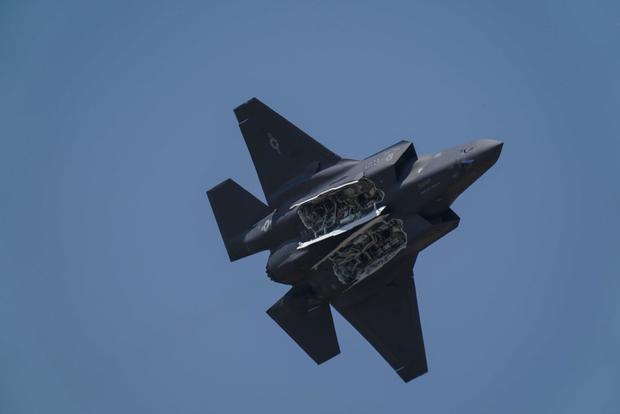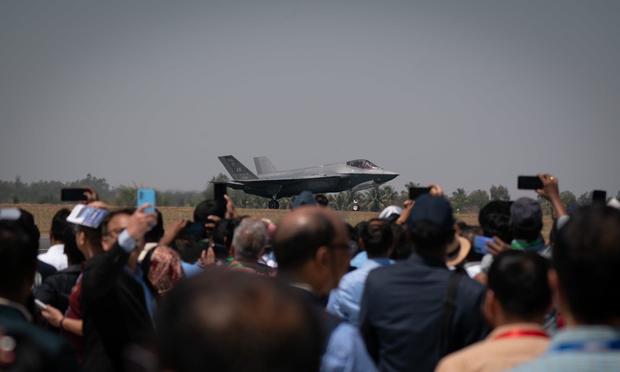When two Lockheed Martin F-35s flown by the United States Air Force roared through Indian skies for the first time this week at an international air show in southern India, spectators were awestruck by the fighter jet’s design and aerobatics.
The fifth-generation fighter jet has stealth, supersonic, and multi-role capabilities – making it the most lethal in the world. And the presence of the aircraft — an F-35A Joint Strike Fighter from Hill Air Force Base, Utah, and an F35-A Lightning II from the 354th Fighter Wing at Eielson Air Force Base, Alaska, along with F-16s, Super Hornets and B-1B bombers — at the weeklong aviation exhibition in Bengaluru fueled speculation whether the American show of strength was a sign of a growing strategic relationship between the two countries or an attempt by Washington to woo New Delhi away from its biggest military supplier and decades-old friend, Russia.
USAF F-35A Lightning II Demonstration Team
“Frankly, we have seen such high-level American participation earlier too … but geopolitically, things are a little different. China is a little more aggressive, so this is significant,” Manmohan Bahadur, a retired air vice marshal of the Indian Air Force, told CBS News.
India has been looking to modernize its aging fighter jet fleet to boost its air power, especially in the face of renewed border tension with China and a decades-old conflict with Pakistan. In 2019, Pakistan shot down an Indian fighter jet after an air clash and captured its pilot.
The United States, which is selective about which countries it sells the F-35 to, has not made it clear whether they have offered the jet to India — nor has the Indian Air Force said anything official about it.
“There is no doubt that it’s a very capable fighter jet, but I don’t think India would consider it as of now … certainly not in the near future because it has to fit our scheme of things, our current systems,” Bahadur told CBS News.
USAF F-35A Lightning II Demonstration Team
But Rear Admiral Michael L. Baker, defense attache at the U.S. embassy in India, said New Delhi was in the “very early stages” of considering whether it wanted the plane. The jets are estimated to have a lifetime cost of $1.7 trillion, according to the U.S. Government Accountability Office.
The majority of India’s military equipment — across the nation’s air force, navy and army — has come from Russia. Last year, when Russia attacked Ukraine, India resisted pressure from its western allies to distance itself from Moscow — the only major U.S. ally that neither condemned Russia in clear terms nor backed sanctions against the country.
But reports say India has been concerned about Russian military supply delays because of the Ukraine war, especially at a time of growing tensions with China and Pakistan.
Major global arms manufacturers were in the audience on Monday in Bengaluru when Indian Prime Minister Narendra Modi announced that India aims to more than triple its annual defense exports to $5 billion over the next two years. While India aspires to become a manufacturer of the sophisticated defense equipment in collaboration with global giants, first to meet its own needs and eventually to export, it will have to depend on arms imports until then.
And the strong U.S. presence at Aero India — which Major General Julian C. Cheater, assistant deputy undersecretary for international affairs of the U.S. Air Force, said earlier this week was “the ideal forum to showcase the most advanced, capable, lethal and interoperable weapons systems the U.S. has to offer” — was a seemingly soft and stealthy pitch for India’s interest.
Stay connected with us on social media platform for instant update click here to join our Twitter, & Facebook
We are now on Telegram. Click here to join our channel (@TechiUpdate) and stay updated with the latest Technology headlines.
For all the latest Entertainment News Click Here


